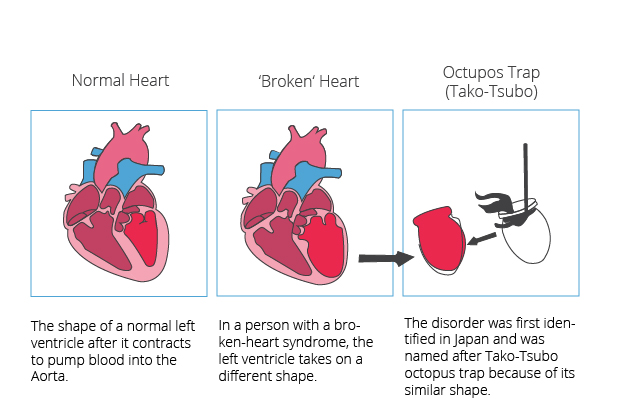Has someone ever told you that they’re suffering from a broken heart? “Is that even possible?” Well, surprisingly, the answer is yes! A broken heart isn’t just a metaphor for intense emotional pain; it can also be a severe medical condition brought on by a poor lifestyle and extreme stress. So, let’s dive into the intriguing world of ‘Broken Heart Syndrome.’
What is Broken Heart Syndrome?
Broken heart syndrome is a temporary disorder of the heart triggered by stress and strong emotions. It can also be due to severe physical ailment or surgery. It is a temporary condition that can still make people feel sick, even after their hearts have healed.

Medically known as Takotsubo Cardiomyopathy or stress-induced cardiomyopathy, it is a rare but intriguing condition that mimics the symptoms of a heart attack. This phenomenon was first identified in Japan in the 1990s and has since captured the medical community’s attention due to its unique characteristics. Broken heart syndrome can strike you even if you are the poster child for good health. In this condition, the heart’s main pumping chamber changes shape, affecting the heart’s ability to pump blood effectively. It soon resembles a Japanese octopus trap called a Tako-Tsubo, hence the name Takotsubo Cardiomyopathy.
Symptoms of Broken Heart Syndrome
One of the trickier aspects of broken heart syndrome is that it often masquerades as a heart attack. The symptoms and test results can be strikingly similar, displaying dramatic changes in rhythm and blood substances typically associated with a heart attack. However, unlike a heart attack, broken heart syndrome leaves no evidence of blocked heart arteries. Instead, the condition is characterized by a temporary heart muscle weakening.
Common symptoms
- Chest pain
- Shortness of breath
- Irregular heartbeat
- Feeling faint
- Fatigue
In some cases, abnormal heartbeats, or cardiogenic shock (a condition where a suddenly weakened heart can’t pump enough blood to meet the body’s needs) may also occur. This condition is potentially life-threatening if not treated immediately. A persistent condition of broken heart syndrome can result in severe, short-term heart muscle failure. However, the silver lining is that it’s generally treatable. Most individuals who experience this syndrome fully recover within weeks and are at low risk of recurrence.
The Difference Between Broken Heart Syndrome and A Heart Attack
Comparing broken heart syndrome and heart attacks, there are some key differences. For instance, in broken heart syndrome, symptoms occur suddenly after extreme emotional or physical stress. Other differences include ECG results, blood tests, and recovery times. Here’s how they are different, as stated by the test results-
• Interestingly, the ECG results, which document your heart’s electrical activity, aren’t the same as those seen during a heart attack.
• Unexpectedly, blood examinations reveal no evidence of harm to the heart.
• The examinations further disclose an absence of obstructions in the coronary arteries, which is remarkable.
• The same tests also display an unusual ballooning and movement in the heart’s lower left chamber, known as the left ventricle.
• Rather surprisingly, the recovery period typically lasts mere days or weeks, significantly shorter than the month-long recovery often associated with a heart attack.
Causes
The exact cause of Takotsubo Cardiomyopathy is not yet fully understood, but it is often triggered by severe emotional or physical stress. Broken heart syndrome can present itself with a sudden, intense chest pain triggered by a flood of stress hormones, particularly adrenaline, which is believed to play a central role in the development of this condition. Some of the everyday emotional and physical stressors are events like the death of a loved one, a sudden breakup, extreme fear, serious illness, surgery, or a traumatic accident.
Interestingly, Takotsubo Cardiomyopathy predominantly affects women, especially postmenopausal women, though it can occur in men as well. The reasons behind this gender predilection are still under investigation.
Diagnosis
How do you find out if you have broken heart syndrome? If your healthcare professional suspects you have this condition, you might need to undergo several tests, including coronary angiography, blood tests, ECG, and cardiac MRI.
To monitor your heart health after a broken heart syndrome diagnosis, your healthcare professional may recommend an echo about a month after your diagnosis.
Treatment
The treatment of Takotsubo Cardiomyopathy centres on managing symptoms and supporting the heart during its recovery. In most cases, the heart muscle gradually recovers within a few weeks. Medications such as beta-blockers and angiotensin-converting enzyme (ACE) inhibitors may be prescribed to stabilize the heart and alleviate symptoms.
Recovery and prevention involve addressing the underlying stressors, incorporating lifestyle changes, and, in some cases, psychological counselling. Engaging in stress-reducing activities, maintaining a healthy diet, and participating in regular exercise contribute to overall cardiovascular well-being and may help prevent recurrence.
Takeaway
What’s interesting to understand about Takotsubo Cardiomyopathy is the compelling reminder of the complex connection between the heart and the mind. While it may be triggered by intense stress, the prognosis is generally favorable with proper medical care and lifestyle adjustments. Increased awareness of this condition among healthcare professionals and the public is essential for timely diagnosis and effective management.
In new research by researchers from Imperial College London, it was found how the increased levels of two molecules could increase the chance of suffering from takotsubo cardiomyopathy. The role of these molecules had been previously found in the blood of takotsubo patients but what role they play in the development of the condition wasn’t known until now.

Cardiac conditions are always complicated, so investing in healthcare plans is necessary to ensure optimal health. Consider joining Ensocure Prime for an excellent health package that takes care of all your healthcare needs at home.

